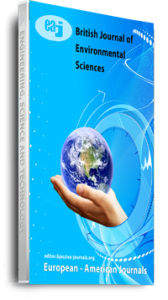This study examines the changes in land cover (LC) types at 6 gas flaring sites in Rivers State, Niger Delta region of Nigeria; and to estimate their emissivity (Ɛ) values. 15 Landsat scenes (3 Landsat 5 Thematic Mapper (TM) and 12 Landsat 7 Enhanced Thematic Mapper Plus (ETM+)) from 17 January 1986 to 08 March 2013 with < 30 % cloud contamination were used. All the sites are located within a single Landsat scene (Path 188, Row 057). Radiometric calibration of the multispectral bands of the data, and atmospheric correction for multispectral bands using dark object subtraction (DOS) method was carried out. The first unsupervised cluster analysis of the atmospherically corrected reflectance (bands 1-4) using the K-mean function of the MATLAB tool was carried out. The results obtained give 3 classes of LC type and cloud as the 4th class. The second cluster analysis was performed with the cloud-masked reflectance (bands 1-4) to give vegetation, soil, built up area and water LC types for all flaring sites. This was confirmed through the fieldwork observation for ground validation of Landsat 5 TM and Landsat 7 ETM+ in the Niger Delta that LC types obtained from satellite data are the same with those observed during the fieldwork. The method used to estimate Ɛ value for LC types at these sites is based on the Ɛ of 4 LC types present at each site. The changes in LC differ throughout the period for the 6 sites due to different human activities within each site. The Ɛ values estimated for the 4 LC types for the sites are not stable but changing from 1986 to 2013 due to changes in LC types. The results of LC classification show that K-mean method can distinguish up to 4 LC types very well in the Niger Delta.
Keywords: Estimation, Gas-flaring, Land Cover, Mapping, Niger-Delta, emissivity

